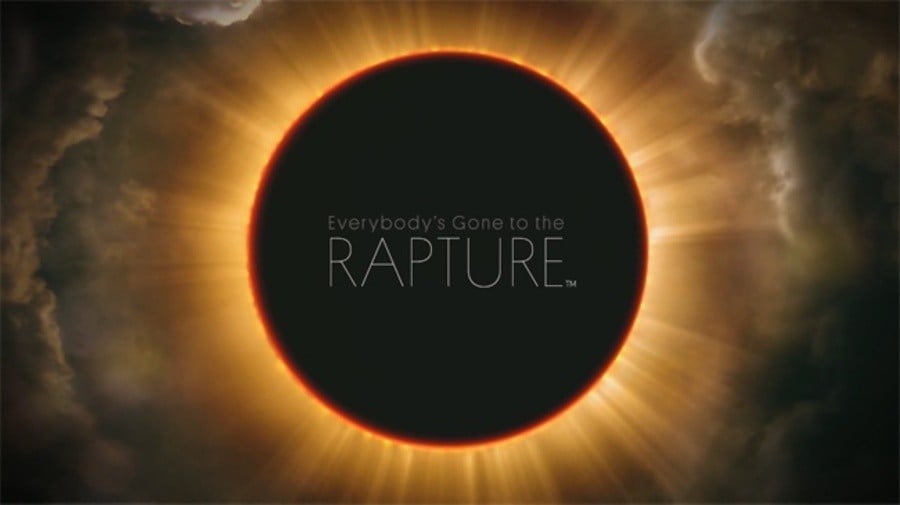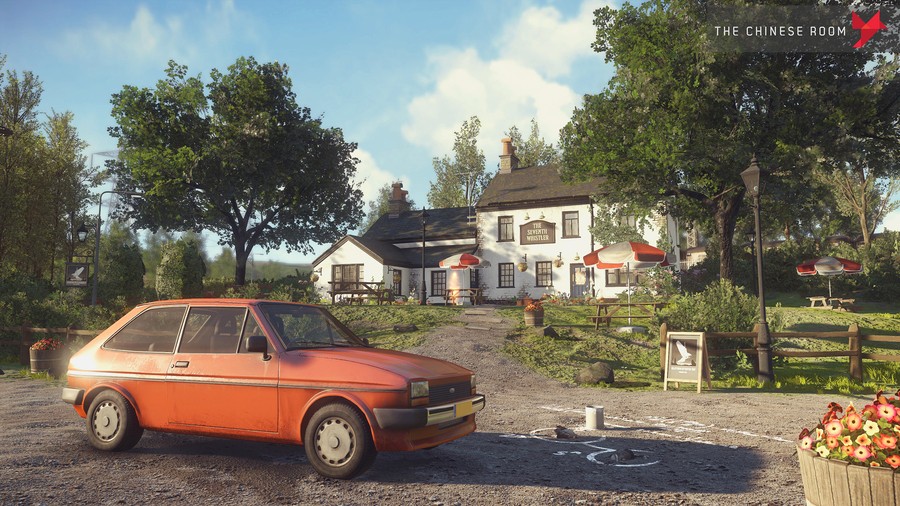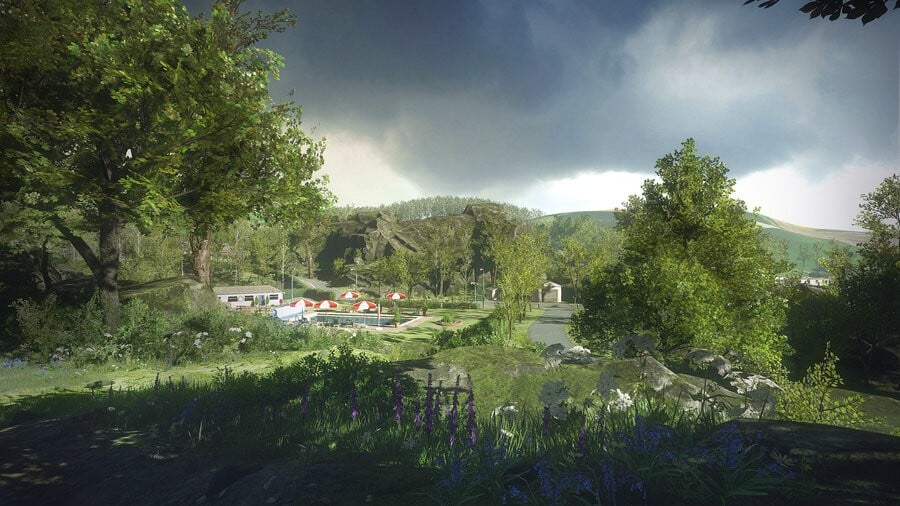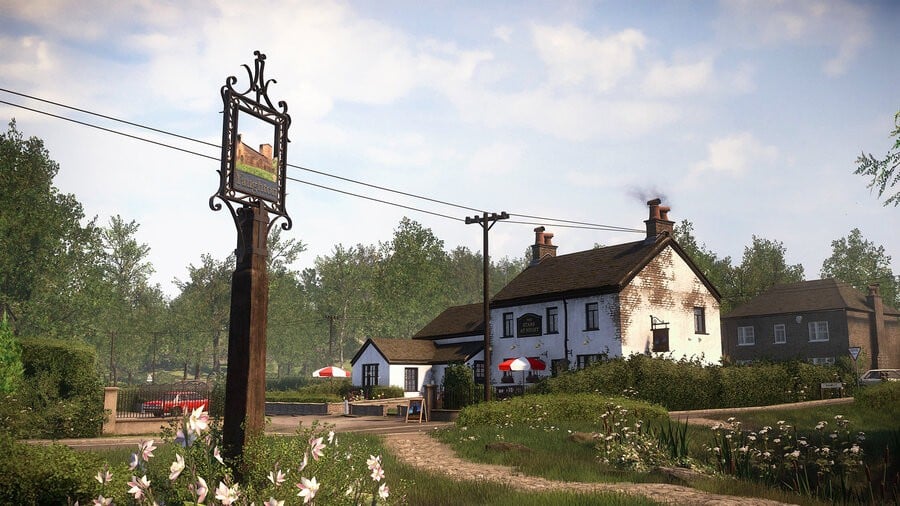
You could argue that the "game" portion of Everybody's Gone to the Rapture is trying to piece it all together. The Chinese Room's latest so-called walking simulator is not especially mechanically dense, restricting much of its action to the DualShock 4's two analogue sticks and a single button. This is a title that's all about atmosphere, then; it's an experience where you simply soak up the story rather than line up headshots. But given the nuanced nature of the plot, what exactly is this quaint English jaunt all about?
As with any half-decent piece of fiction, you can divide this release into two parts: the literal and the figurative. Given the way that the story's presented – through exposure to disjointed character interactions – neither aspect of the plot is immediately obvious. Not every conversation is mandatory either – there are many optional exchanges that you'll simply stumble upon as you wander around the world – so you have to ensure that your ears and eyes are open at all times in order to soak it up.
Of course, if you've just watched the credits roll and haven't a clue what's going on, then we have a few theories of our own about both the events in the story and their underlying meaning. It goes without saying, though, that if you've yet to beat the game and don't want certain events to be spoiled for you, then you should look away now. Seriously, we're going to blow the whole plot wide open, so tickle that 'Back' button on your browser quick. We should also stress that all you're about to read is just this author's personal thoughts – we'd encourage you to debate and discuss in the comments below.

A strange loop
So, let's begin with the top-level stuff: what's the game actually about? This is a good starting place because it's been largely evident since the first trailer: it would seem that the main theme is about how we, as people, live on beyond the expiry of our physical selves. As explained above, the narrative is relayed through a series of memories, giving the partaking cast life after their death. A code at the conclusion of the credits confirms as much, as it translates into a quote from cognitive scientist Douglas Hofstadter's novel I Am a Strange Loop:
"In the wake of a human being's death, what survives is a set of afterglows, some brighter and some dimmer, in the collective brains of those dearest to them. There is, in those who remain, a collective corona that still glows."
In other words, those who remember us prolong our Earthly existence long after we've left our bodies behind. But who is it that's observing the occurrences in Yaughton, and why? Why is the traditionally sleepy village in quarantine? Why are people disappearing? And what's up with the bloody handkerchiefs strewn across every front room? You may choose not to look too deeply into these aspects of the narrative, but the developer has left enough bread crumbs to make this area of the escapade worth examining.

Literally speaking
The key characters in the plot are married couple Kate – the American heard through radio broadcasts – and Stephen, the short-tempered Brit. Both protagonists work at the observatory, though Stephen's ties to Yaughton are a little more deeply rooted; he grew up in the area before moving away, and has now temporarily returned to his home town with his wife in tow. The couple are conducting experiments focusing on data that Stephen has found, and ultimately happen upon some form of otherworldly 'entity', which subsequently travels to the village. Many residents recall an interstellar event, which is likely the arrival of the alien being.
A series of events escalate from here: birds begin to fall from the sky, while livestock later dies. Meanwhile, elderly villagers gradually begin to disappear – transformed into light motes and ashy substances, it transpires – while younger humans begin to contract strange flu-like conditions. The village is eventually locked down due to an "influenza" outbreak, but Dr. Wade – the village practitioner – laments that he's never seen anything like it in all of his years as a quack, while there are many references to people seeing "liquid light". It seems certain then that the 'entity' is attempting to either communicate with the people, or find a host.
Stephen realises this and uses his connections to order a chemical strike on the village – the intended outcome being to wipe out all of the people and subsequently the 'entity'. He considers the extraterrestrial substance hostile, but laments later that he could be wrong; the foreigner may simply not realise that it's hurting people, and he likens this to his own childhood encounter with a fox. Irrespective, he immolates himself, despite sensing Kate's presence in the 'entity' at the last minute. We later see Kate and the 'entity' fusing, suggesting that at this point they were one.
If we assume this to be accurate, it seems likely that you are playing as the 'entity' after it has established full communication with Kate. This introduces a handful of additional themes: Kate, for example, is frequently treated as an outsider in the village – and subsequently seems able to empathise with the 'entity' more. Also, with Stephen engaging in an affair with childhood sweetheart Lizzie, she's the only person in the village without a significant other. A lot of the sub-dramas in the story revolve around relationships, so this seems to be a key motif. It just so happens that Kate ends up being matched with the 'entity' rather than another human being.

Only in Emmerdale
So, what of these sub-plots? A lot of the game's mini-dramas perhaps wouldn't be out of place in an episode of Emmerdale, and are generally standard British soap opera fare. But it's unique territory for a video game, and they add a little more grounding to the surreal nature of the overarching plot. Jeremy, the village's pastor for example, grows increasingly weary of his inability to protect his flock over the course of the story, and as he rings the church bell to summon his parishioners only for no one to arrive, he collapses at the altar and eventually succumbs to the 'entity'.
There's more to Jeremy than meets the eye, however, as it's heavily implied that he played a part in the assisted suicide of terminally ill Mary, the wife of farmer Frank. It's pointed out throughout the story that Frank promised to be present during his other half's final moments, but he backs out at the last minute. Subsequently, when he learns that Stephen has requested a chemical strike on the village, he initially considers warning everyone to escape, but he later looks down upon the town as the bombs fall, seemingly unwilling to make the same mistake that he made with his wife and leave his friends behind.
The final major character is Lizzie, who's the childhood sweetheart of Stephen. Despite them both marrying other people – and Lizzie suffering an accident leaving her disadvantaged – they embark upon an affair, and it's hinted through the unique nature of the guiding orb in her section of the story that she's pregnant. Interestingly, by the end of the plot, Kate is aware of the affair, and she seems to bless it with her final words.
Of course, there's even more to the game if you look for it: the ongoing butterfly motif and the ubiquity of the infinity symbol, for starters, which one would assume are intentionally linked. There are also numerous references to classic science fiction, such as the word VALIS – which is the name of the observatory – and appears to be inspired by a 1981 novel by American author Philip K. Dick. On top of that, we're sure that there's plenty that we've missed; one ongoing theory suggests that there may be a hidden message in the numbers read out by the radio signals, for instance.
Either way, it's clear that The Chinese Room has packed a lot into Everybody's Gone to the Rapture, and while we feel like an English A-level student at the moment, we've definitely had a lot of fun discussing our theories here at Push Square Towers over the past week or so. Clearly the game's proven very divisive – the opinion's even split here in the office – but it's refreshing to play a title that can provoke these kinds of reactions, even if it's clearly not for everyone. What are your thoughts? What did we get wrong? Let us know.
What do you think Everybody's Gone to the Rapture is about? Are there any key themes that you think that we missed? Do you feel that we've misinterpreted parts of the plot? Enlighten us with your perspective in the comments section below.
[source youtube.com, via neogaf.com, lazygamer.net]





Comments 18
Honestly I think you hit pretty much the same marks and more that I was thinking. I felt really torn by this game. I know there was things I missed only because of the painful walking speed, and how long/selective the run button was to get functioning. There were a lot of areas that I wanted to go back to, especially when I found the back entries and shortcuts, but chose to move on instead of spending an additional hour just walking to and from. I don't mind walking simulators, and the storyline, music, atmosphere, everything just was great, minus the walking/Sprint speed which for me, took my interest, immersion out of the game and really ruined the pacing. There were massive, key story's that I would get this beautiful swelling music on my way to the next light or radio or phone only to have the music cut into silence while I was a minute or 2 away, which with proper pacing and speed I could have hit that point while the music hit its high note, furthering the immersion and emotional response.
Overall I hope they patch in a real Sprint or speed increase, because I'd love to delve into what I missed, and really debate the story, but I have no interest in dealing with the excruciating walking and running speeds again.
@BigDaddyT0101 Glad to hit the mark with you - it's quite scary putting out articles like this to be honest. And I agree, the game has several issues, including the walking speed - but I'm glad to see things like this start to find a reason to exist, as God knows we could do with a bit of variety beyond 'angry man with gun'.
A sprint button should be an easy patch you'd think, but I wonder whether they'll do it. We'll see...
@get2sammyb agreed, I love when developers take a chance and we get things like this, some of the storylines really touched me, the writing was just outstanding, and I've been seriously debating buying the soundtrack it's that good.
@Cyber-BLP-- I think that's fair. For me personally, I enjoyed prodding and probing the environment and lapping up all of the little morsels of narrative — my issues with the game were actually elsewhere — but it's certainly an acquired taste.
I think that's absolutely fine. Just because it's not everyone's cup of tea doesn't mean it shouldn't exist, though - it just means different people like different things, which is true of everything in life.
You say tomato, I say tomato, etc.
@Cyber-BLP-- I actually found this more unsettling than most 'proper' horror games, but that's just me. Besides, if you want a story-driven horror game with more "traditional" gameplay - that's The Last of Us, right?
@Comrade44 Depends how thorough you are. I'd recommend enjoying the story before looking at the Trophies, though. Also, you should definitely not read this article if you haven't started it yet.
I watched two Youtubers playing this earlier today (both I would highly recommend for different reasons) and the views are so different from one an other. Yogscast Kim absolutely adored it, she explored as much as she could to find most of the story, she's even engaged with people on reddit regarding the potential theories. On the other end there's Nerd Cubed who flat out hated it because he felt it was just a radio show masking itself as a game. That's not to say that there comments aren't valid but what I can't stand is when some people dismiss games like this, saying "it's not a game" because I feel the industry shouldn't be restricted to preset rules to define itself because no industry does that. Of course no game is for everyone but some seem to be too happy to remind everyone that they hate this game because it doesn't conform to what they feel games should be.
@adf86 There's a Talking Point in this...
I just got the plat today, using walkthroughs. It's a pain, to put it mildly.
Easy enough, but man can it be boring, the walking speed is like waiting for paint to dry. 'Running' is not much better.
And that is one of the biggest issues with the game for me, because if I didn't have the walkthroughs to use as guidance, I'd never have the patience to walk back and forth to every nook and cranny of the different areas.
It's nice with a different kind of game, for sure and the story gives a lot of material for discussion and pondering over the higher meaning of it all.
I felt like it needed a sprint speed mode, a way to find out where you were (portable map?) and maybe a statistics menu, where you could see where you've been, who's story you have heard and possibly read it again.
Lastly, I think it should have been a free PS+ game.
After playing the mind blowing Fez and both gameplay and artsy flair go hand in hand. The likes of Journey and Rapture are great experiences, and defining releases for this generation - but I'm unsure if they are games.
There is no challenge and that's the point to enable everyone to see the conclusion. But that barrier to entree 'you can only see the end if you are good enough' has always differentiated computer games from other mediums ultimately.
After playing telltale games for a while and enjoying them alot I have slowly gravitated towards, and have since been watching the amazing metal gear alchemist. Which hits all the same emotional notes as the telltale games and then some. I'm just gonna stick to amazing anime which cover similar subjects the button presses just get in the way of what ultimately is a show. Tales from the borderlands illusion of choice has now become a reality in the lack of control.
I've just finished this game and have got to say no other game has left me feeling like this one did. It's a mixture of loneliness, sadness, and a wanting for all questions to be answered clearly. But it's these things that make this game so good. I will admit the walking part was a little tedious but it forces you to drink in the environment which is what this game is all about. The author of this article was right when he said something to the effect of this game being more disturbing than a traditional horror game. I totally get it and agree 100%. The pacing of this game will not be for everyone but if you're someone who can sit and be patient this game is completely worth it.
@get2sammyb I think you've more or less nailed it. This was what I took away from it, after some head scratching and staring blankly at the credits rolling.
I thoroughly enjoyed discovering all the little story segments, and a lot of them were really quite unsettling and moving. The writing and, perhaps more so, the acting in this game were top notch, which in a game like this is make or break territory.
I'll echo what others have said and say the movement speed was definitely a problem. Personally, I was fine with it until I was in Stephen's chapter, following what I thought was the natural path to the next chunk of story, and found myself back in Frank's countryside area. Que a lot of backtracking and getting lost. By the point that this happened I was totally engrossed and just wanted to continue the story and losing my way like that pulled me out of the game a fair bit. I'm not one for trophy hunting but unless they patch in a faster means of traveling, I doubt I'll play this again any time soon.
Overall though I think The Chinese Room should be applauded for telling a story with themes not often explored in games, and for their excellent work in the writing, acting and soundtrack. I realise this comment has turned into a sort of mini review, rather than discussing the plot to any extent...
Basically Sammy, I agree with you.
I read this after hearing how slow the game is. Glad I did! That's one of the dumbest stories I've heard in a long time, and completely not what I thought this was about.
Seriously? Aliens? Good lord.
@Johnnycide Well, that's just my interpretation of the story - I could be wrong. And even if I am right, it's not 'aliens' as in my avatar.
You can run, but it's still too slow and takes a while to increase in speed - if the game wasn't so sluggish however it wouldn't feel this bad, almost like it was developed on a PC which ran it at 60, then they shovelled it onto a PS4 and never adjusted to cope with it barely managing 30.
@get2sammyb if it was then GOTY right there.
The more I read about this game the less likely I am to play it not my cup of tea, maybe i'll try it when it's free lol.
I absolutely loved this game. The walking/running could be sped up a bit but this was all around one of the greatest gaming experiences I've ever had.
I could be wrong but I got the impression from some of the concersations that Kate was African American. If that's the case then your character wouldn't be Kate since your character is light skinned. If I'm wrong on that though I do love the theory of Kate and the entity binding as one and going through all of these memories.
Great article!!!
I'm still debating about this one.
Show Comments
Leave A Comment
Hold on there, you need to login to post a comment...